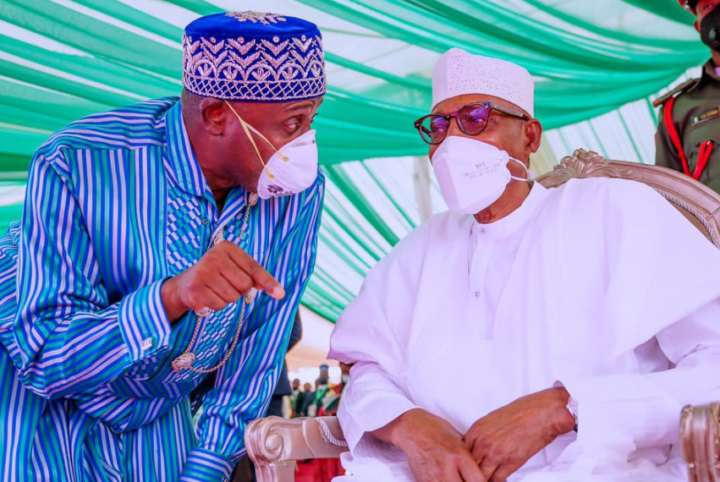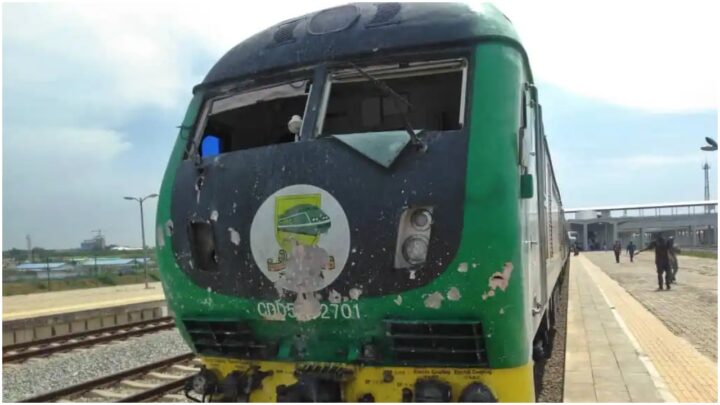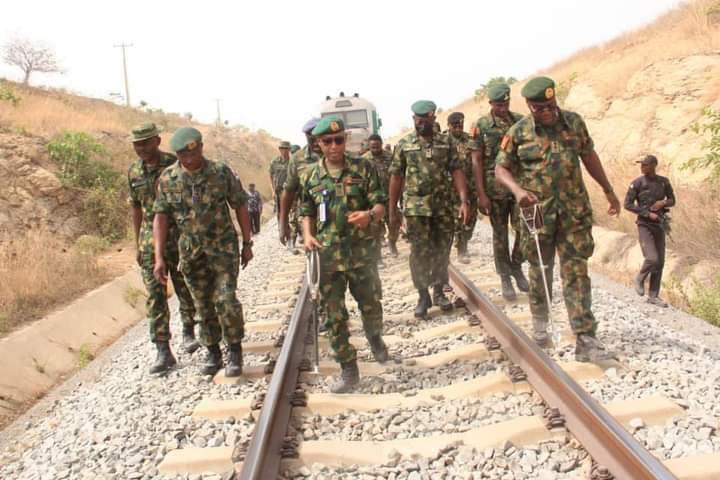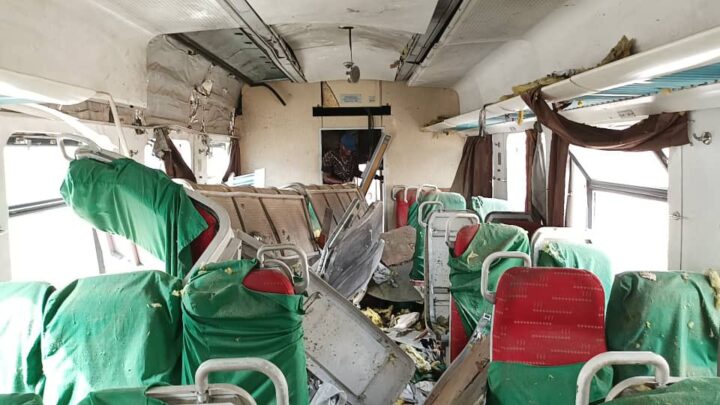Prior to the July 11, 2007, coordinated bombing of commuter trains in India’s largest city of Mumbai, Indians, like Nigerians, were wrapped in the shawls of their innocence and naivety. On that day, terrorists violently yanked the terror purity shawls off India’s face. In a matter of minutes, multiple explosive devices were detonated in a near-simultaneity. The devices instantly killed at least 183 people, with hundreds of others sustaining varying degrees of injuries. In a replay of this Mumbai attack in Nigeria last week, at least seven passengers were killed after gunmen attacked a busy train plying Nigeria’s capital, Abuja, and Kaduna. The terrorists were reported to have mined the track, ostensibly with IED explosives and subsequently forced the 840-capacity passenger train, with 362 validated passengers, to a halt. They then made a ring around the train’s coaches, opened fire on the defenceless passengers and abducted an unknown number of them from the train.
As worthwhile as a means of transportation as they are, train services in Africa came with resistance and revolt. While some African rulers like Emperor Menelik of Ethiopia and Abbas I of Egypt favoured its establishment, so many others disapproved of it, basing their resentment on the landscape of power and trade that it would tilt in favour of the colonialists. Major opposition to it was mounted by the Damal of Cayor, Late Dior Diop of Senegal. While voicing his rejection to French governor, Servatius, he had said: “As long as I live, be assured, I shall oppose, with all my might, the construction of this railway”. This notwithstanding, Africa’s network of railways got started in 1852, in Alexandria, Egypt.
The eyes of terrorists first opened to the mass murder weapon that trains constitute when, on September 13, 1931, a bomber, Szilveszter Matuska, derailed the Vienna Express train by planting a bomb that killed 22 and wounded 120 others. Since then, terrorists have targeted train services’ full infrastructure like ticket halls, railway bridges, trains, passenger stations, train depots, signalling and tracks. Indeed, urban commuter rail networks and subways, otherwise known as mass rapid transit rail systems, have been the soft target of the majority of terrorist attacks. These have led to approximately 1,000 being killed, with over 5,000 injuries, as well as economic losses of billions of dollars. The March 11, 2004, Madrid bombings held to be one of the most sophisticated terrorist attacks on a rail target which killed 191 people, for instance, there was a simultaneous detonation of 10 devices comprising Goma-2 Eco plastic explosive detonated by a mobile phone.
Like a water-dripping sore that naturally attracts a horde of flies, commuter trains have never been the same again after the 1931 Matuska attack. They have since been a special delicacy with which terrorists enjoy sumptuous a la carte meals of their victims’ flowing blood and mangled flesh. This is because train attacks come with a high fatality, mass disruption, huge national alarm, paralysis of the transport network and the national physiological and psychological trauma that goes with it. This is not to talk of the economic loss and long-term dislocation the people face in its aftermath.
Advertisement
The attacks are coordinated by terrorist groups with various attack methods. The list is endless, ranging from Al-Qaeda and its ancillary groups, Algerian and Chechen militants, Kashmiri separatists, South America’s left-wing guerrillas and Irish republican terrorists. London Underground and British Railways were said to have attracted more than 6,500 bomb threats between 1991 and 1997. On August 23, 1973, for instance, the Provisional IRA (PIRA) had targeted the mainland UK rail system by defusing a bomb at Central London’s Baker Street Underground station. Terrorists’ major modus operandi, tactical spectrum and operational template contain the detonation of improvised explosive devices (IEDs).
Asked why he caused so much pain to his victims, Matuska had told his interrogators that he derived sexual pleasure from watching trains crash. Since then, the global statistics of train attacks have mounted unconscionably like Nigeria’s national debt. Eight years after, on August 28, 1939, during the Nazi World War 11 German invasion of Poland, a German agent, Antoni Guzy, also placed a suitcase bomb at a busy railway station which killed 20 and wounded 35. According to the database of Jane’s Terrorism and Insurgency Centre, between the period 1998 and July 2006, at least 74 separate terrorist attacks were unleashed on heavy rail, metro subway systems and light rail systems in the whole world, as well as on trains and other rail infrastructure.
Since that last week’s attack, Nigerians have been wrapped up in the shroud of sadness. Newspaper features focusing on the victims made matters worse, evoking grim and tears in the people. Sijuade Oyetoso, TUC chairman, said to have been shot in the head inside the train, as well as Dr Chinelo Megafu, the young medical doctor graduate of the University of Port Harcourt evoke sessions of tears. Just a few days before this attack, heavily armed terrorists had attacked the Kaduna airport, and by the time they finished the operation, a security guard was shot dead. This led to flights cancellations.
Advertisement
Only yesterday, a news report said that no fewer than 1,545 persons had been killed by terrorists in the first quarter of 2022. Quoting a joint report by the Community of Practice Against Mass Atrocities and the Joint Action Civil Society Committee, under the aegis of Nigeria Mourns, the report also said that at least 1,321 persons were abducted by these terrorists between January 1 and March 30, 2022, with Nigeria’s north-western states of Kaduna, Zamfara, Katsina, Kebbi and the north-central state of Niger, coming under intense shelling by these cadaver-loving terrorists. While kidnapping for ransom has become commonplace across Nigeria, this selfsame Abuja-Kaduna highway has acquired the notoriety of one of the most dangerous roads in Nigeria. Kidnappers string around it like ants make a ring around the pee of a diabetic, ambushing vehicles at several points on the expressway corridors, killing many and constituting selves to lords of the Manor on the road.
With the above unflattering statistics, it will appear that, by still being shocked by attacks from terrorists, Nigerians, like the proverbial ostrich, are in the first stage of the psychological state of denial of the reality that their country is a terror corridor. In the architecture of terrorism, mass commuter rail transport is one of the most vulnerable weapons of terrorists and terrorist attacks. Indeed, global graphs of terror attacks since Matuska’s have shown clearly that Islamist militant groups have a notorious interest in specifically targeting rail transport because of the mass casualties that often come from such attacks. The question to then ask is, were the minister of transportation, Rotimi Amaechi, the national security adviser, Babagana Monguno, their commander in chief, Muhammadu Buhari, and the coterie of so-called securocrats who surround the seat of power, so naïve about the pleasure that terrorists derive from attacking trains, so much that they didn’t know of this elementary fact?
Whether out of ignorance, the usual lackadaisical attitude of Nigerian leaders or their oft quest to always put financial interest ahead of the people’s welfare, when the train attack is reduced to its brass tacks, it will be difficult not to ascribe the deaths of these innocent Nigerians to a deliberate wastage of citizens’ lives that is the familiar penchant of her leaders. The logic is that since it is no longer news that Nigeria has become a notorious terrorism corridor, how does one explain why the government had to be picking its tooth while train commuters plied the Abuja-Kaduna notorious route, or any other train route in Nigeria, without adequate security? Apart from the fact that Kaduna state has become one of the most dangerous places to live in Nigeria, it is a known fact that the Abuja-Kaduna highway is one of the most dangerous roads in the country. It is full of a swarm of kidnappers who are known to ambush vehicles at several points on the expressway. Taken all together, one can then safely say that the blood of these innocent citizens, shed violently midstream, bears the government’s vicarious hands.
With the subsequent leakage of a memo said to have been presented by Amaechi to the federal executive council (FEC) but which was rightly rejected, it becomes a necessary conclusion to say that this wastage of the people’s lives in that train attack must have been due to one of three probable reasons, or even all: Sabotage by those hungry to prove a point, the government’s deliberately naive trivializing of the destructive powers of terrorists and third, the cruelty of government’s act of placing the cart before the horse. By preferencing the publicity stunts inherent in rushing first to shore up the sagging government’s public credential through the launching of the train “revolution” in 2016, rather than putting in place a simultaneous installation of security gadgets for the protection and safeguard of people’s lives, the Nigerian government can logically be said to have the blood of the people dripping from its hands.
Advertisement
Amaechi was said to have presented the wishy-washy memo to the FEC presided over by Vice President Yemi Osinbajo on September 24, 2021. In it, he had requested FEC approval of N3.7 billion for a contract on surveillance systems along the Abuja-Kaduna rail track. In presenting the proposal, Amaechi, the two-term governor of Rivers state and a seven-year minister, had recommended a firm, Mogjan Nigeria Limited, with very manifest incapability and nil track record of previous handling of such contract, as his preference. The company, incorporated on August 6, 2019, less than three years ago and with a turnover of N84.9 million, was Amaechi’s best for the execution of such a humongous job. To worsen matters, this leaked memo was said to have revealed so many more incongruities which, were it to be in a saner clime, Amaechi should have been fired for gross misconduct and laxity. Upon the attack, however, while fielding questions from journalists, Amaechi had claimed that he predicted the imminence of the attack and, ostensibly gloatingly, condemned the rejection of his memo presented before the FEC.
A few questions arise from this macabre atilogwu dance that Amaechi and the federal government are making on the graves of Nigerian dead. The rail services “revolution” was commissioned in July 2016 by President Buhari and this same Abuja-Kaduna train was the anchor. Speaking at the train’s main station at Idu, Abuja, Buhari promised that government would link all states and commercial centres of Nigeria with the rail lines. He later took a ceremonial train ride from Idu to Kubwa. This was at a time when terrorists’ bayonets were penetrating the nooks and crannies of Nigeria.
If Minister Amaechi was then presenting a memo for the procurement of security gadgets on that corridor in 2021, five years after the train services commissioning, it will mean one of three things; that Amaechi was totally naïve about the destructive powers of terrorists, that he was unapologetically simplistic about it or was grossly unmindful of the need to provide ancillary security of the rail systems to go simultaneously with its commissioning. Or could it be that he just didn’t care? By presenting such an embarrassingly empty doggerel as a memo to the highest decision-making body in Nigeria, it seems to point to the fact that such a regime of laxity, rigourlessness and, I dare say, fakery must have marked previous presentations to FEC which their sponsors got away with and which strengthened him to present a similarly vacuous memo. The memo may just be pointing at a pedigree of maggot infestations in procurements and contracts at the highest level of governance in Nigeria.
It will appear that the Nigerian government and its so-called securocrats are only excellent when it comes to filching budgets of security. For a Nigerian military that went to field operations across the world, garnering laurels and badges of honour for its performance, the only explanation for this feigning of counter-insurgency inability by the Nigerian military must be the gross national larceny sense that has infiltrated the high command of the Nigerian security. Like Eddy Iroh said in his ‘Toads of War’, Nigerian military generals have grown rotund bellies and cheeks like toads out of this terrorism calamity in Nigeria. It is why there is mutual suspicion, jealousy and efforts at cross-purposes across the forces.
Advertisement
Otherwise, in the rest of the world where terrorist attacks occurred, military generals, working with the entire national security architecture, took time to study the psychology of the attacks, with a view to countering them. Russia, Germany, Pakistan, Angola, South Korea, Colombia, Japan, UK, France, Spain, Italy, India, Philippines, Sri Lanka and Venezuela, among others, have witnessed a worse form of terror on their railway networks than Nigeria did. Immediately after terrorists attacked the World Trade Center on September 11 2001, the New York subway became a recipient of its disruption as almost a quarter of a mile of its tunnel got filled with debris from the bombed twin towers, in addition to structural damage to three stations. After these attacks, counter-insurgency experts went into spirited work to prevent further attacks. One, they found out that, aside from the mass murder that trains pose to terrorists, the long-term economic loss, as well as massive scare on the collective national and corporate psyche, are the garlands that terrorists are obsessed with, which make train attacks their most desirable option. The 2004 Madrid rail bombings, as well as the 2005 attacks on London’s transport network, are good examples here.
In Nigeria, however, knowing the ancient predilection of our leaders for being lax and greedy, train attacks like the one of last week are likely to intensify. Terrorists are far more committed to their craft than those paid to keep watch on the people. Security experts know that bombers don’t just strike without doing reconnaissance and survey of targets. In the Abuja-Kaduna train attack, some of the terrorists were said to have been on board. Did our security know this?
Advertisement
With the soft target that bombing and attacking trains pose in terrorism corridors worldwide, chief of which Nigeria is, it will be gross criminal laxity or inexplicable compromise for the Buhari government not to have anticipated the Abuja-Kaduna train attack. By seeking to install that security equipment in 2021, it showed that Amaechi had an awareness of the threat terrorists posed. So what has happened between then and now? Did he fold his arms? Those who claim that there is a dalliance between top government officials and terrorists may have had corroboration material in this train attack. It reminds me of Willo Davis Roberts’ Blood on His Hands, the story of 16-year-old Marc and his bloody travails and confrontations. One thing that is not in doubt is that the blood of the murdered is crying for vengeance from the Buhari government.
Rotimi Williams alive in Wole Olanipekun
Advertisement
Since his death in March 2006, not minding the galaxy of topnotch legal colossi that Nigeria has sired ever since, many schools of thought hold that Nigeria had not been able to reincarnate Chief Frederick Rotimi Alade Williams, QC, SAN. I argue to the contrary, however, that, in Chief Wole Olanipekun, Williams is very much alive with the Nigerian bar. The late Queen’s Counsel had oscillated in the legal firmament, both literally and with his immense physical stature.
Like Williams, Olanipekun has also traversed the world of law. First Nigerian to become a Senior Advocate of Nigeria (SAN), a staunch member of the Action Group, minister for local government and Western Region’s first attorney general, the first Nigerian to be so appointed and then, minister of justice in 1959, Williams became president of the Nigerian Bar Association (NBA). When lawyers cite groundbreaking precedents like the Lakanmi vs the Western Government of Nigeria and the landmark case involving the Oba of Lagos, Adeniji Adele against the Nigerian National Democratic Party (NNDP), Williams’ legal wizardry and imprimatur encompass them all.
Advertisement
Years after Williams’ departure, however, arguably, there is no Nigerian lawyer who has traversed the firmament of law like Ikere-Ekiti-born legal colossus, Olanipekun. Thus, when the Nigerian Body of Benchers, a professional body that is concerned with the regulation of the legal profession in Nigeria and admission of prospective students into the Nigerian Law School, chose Olanipekun as its chairman, the reverberations of that choice have persisted across the length and breadth of Nigeria.
Called to the bar in July 1976 after graduation from the Nigerian Law School and becoming a SAN in July 1991, Olanipekun eventually became Ondo state’s attorney general and commissioner for justice.
Perhaps the most-talked-about period of his legal career and which happens to be his most profound engagement with the bar, was in 2002 when he was elected president of the NBA. Legal pundits liken that period to the Alao Aka-Basorun leadership of the bar for its overarching impact on the profession and the lives of the individual bar member. The year after, Olanipekun got appointed vice president of the Pan African Lawyers and in January 2007, became a life bencher, one of the most prestigious heights of attainment in the law profession. The University of Ibadan still talks with nostalgia about his period as its pro-chancellor and chairman, governing council between 2004 and 2006. Apart from being a fellow of the Chartered Institute of Arbitrators (FCIArb.), Olanipekun was also bestowed with the national honour of officer of the federal republic (OFR).
Olanipekun’s appointment as chairman of Body of Benchers is the icing on the cake of a firm leadership of the Nigerian lawyers that he has given over the years, as well as an authoritative stamp on his demonstrable pedigree of proven track records at the bar. These will no doubt push the Nigerian bar into greater achievements.
Congratulations, Learned Silk.
Views expressed by contributors are strictly personal and not of TheCable.
Add a comment







